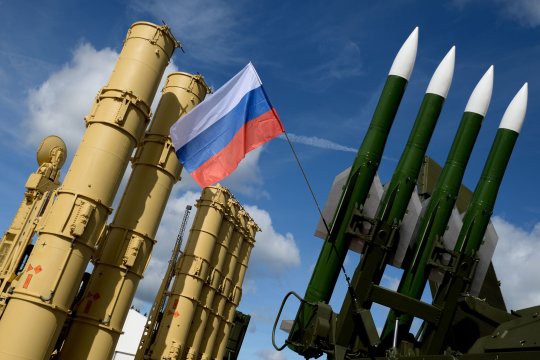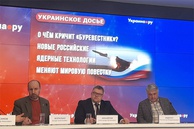The United States and the West proceed from the following premise: “With the Cold War over, many thought that any conceivable reasons that could lead to a nuclear war had disappeared.” [i] However, the desire to colonize Russia and make the territory of our country, its people and resources serve the interests of the West remains very much there.
Hiding behind the Western denial of reasons that could lead to a nuclear war is their fear of a nuclear retaliatory strike. Alternating between calls for humanism and for demonizing Russia, the West declares that under the present circumstances no one has the right to use nuclear weapons. This reveals what it fears most.
What conclusions can be drawn from the current situation?
There are at least two scenarios being discussed by experts and politicians:
- there is no reason to be afraid of discussing the real possibility of using tactical nuclear weapons;
- we are being provoked to use nuclear weapons in order to hold us responsible for starting a nuclear war.
Proceeding from the abovementioned opinions, we need to have in mind the fact that attempts at nuclear provocation have been undertaken by Ukraine under the supervision of the West throughout the entire period of the Ukrainian crisis (the situation around the Zaporizhzhya nuclear power plant), and Zelensky’s nuclear rhetoric was one of the reasons why Russia launched its special military operation in Ukraine. In this case, these two scenarios intertwine.
In the first scenario, there are the following arguments, formulated by Sergei Karaganov [ii]: “Russia’s endless patience may wear thin. The use of nuclear weapons does not mean a nuclear disaster. Nuclear weapons can be used to sober up and end the war... This war must be stopped, including in order to save as many lives as possible of the people whom Putin called the “new elite,” who must implement the tasks and achieve the goals that the president outlined in his address to the Federal Assembly.” Karaganov's arguments carry a lot of weight.
How does the “conventional arrogance” of the West manifest itself? The latest examples of this have come in the form of a flurry of Western approvals for Kyiv’s use of Western weapons to strike Russian territory, provided that these weapons are used “to protect the Kharkiv region, against targets that threaten the Kharkiv region.” Here one can even find some kind of appeal to justice, hints at the responsible behavior of the West, which it is trying to shift to Ukraine, and then the cruel laws of war come into play, which the West has defined for itself as “acceptable losses.” These statements are intended to mold “the true history of a world based on rules,” where, according to the West, the principle “as it was said, so it was” applies.
At the same time, the United States says it is exercising some kind of “control over the escalation” of the conflict in Ukraine. This has been stated by retired General Ben Hodges, and the sequence of events is as follows:
- “[US] President Joe Biden - D.B.] recently directed his team to ensure that Ukraine is able to use US-supplied weapons for counter-fire purposes in the Kharkiv region so Ukraine can hit back against Russian forces that are attacking them or preparing to attack them,” a US official said in a statement issued by the administration. “Our policy with respect to prohibiting the use of ATACMS or long-range strikes inside of Russia has not changed,” he added. [iii]
- Retired NATO General Ben Hodges explained Washington’s ban on the Ukrainian Armed Forces using ATACMS missiles for strikes inside Russian territory by “excessive fear” of escalating the conflict. According to him, the US authorities’ priority remains “control over the escalation” of the conflict in Ukraine: “This step demonstrates “excessive fear” in Washington that Russia will somehow escalate the conflict,” Newsweek quotes him as saying. After Washington allowed the Ukrainian army to launch strikes on the territory of the Russian Federation, Western media emphasized that this would not affect ATACMS missiles. [iv]
While Washington still fears a possible escalation with Moscow, Britain and France have already gone further allowing Ukraine to strike with their weapons; German Chancellor Olaf Scholz backed their decision arguing about the need for such actions in the Kharkiv region. Only then did the United States gave the go-ahead, with the only reservation that ATACMS missiles not be allowed to strike deep into Russian territory. A truly Jesuitical decision now that ATACMS missiles have been busy trying to hit Crimea, Sevastopol and the Crimean Bridge, although for Washington this is all Ukrainian territory. As for the Kharkiv direction, this is Russian territory. Therefore, the question is whether Europeans, above all the Czechs, understand the meaning of the American ban on ATACMS strikes on the Kharkiv track. After all, Belgorod has long been under fire from the Czech Vampire multiple rocket launchers, which means that Czech rocket artillery specializes in attacks on the Belgorod region. The Americans do not allow strikes with their own long-range missiles, thus exposing the Europeans and keeping the situation “under control.”
In Moscow, Higher School of Economics professor Dmitry Trenin thus explains this behavior:
“The Americans’ conviction of their own impunity and the Europeans “strategic parasitism,” devoid of any sense of self-preservation offer a dangerous combination. This gave rise to the idea to inflict a strategic defeat on Russia, a nuclear power, in a conventional proxy war in Ukraine. Looks like Russia’s nuclear potential was thus taken out of the equation.” [v]
We can and do respond to “conventional impudence” with our conventional weapons, which are superior to Western ones, especially when it comes to supersonic missiles. Here Russia has only one restraint left - the “Kinzhal” missiles are not yet going after the Ukrainian political and military elite, nor are they striking at their decision-making centers. Russian missiles “conventionally hint” at future problems with Ukraine’s collapsing energy sector, and all other facilities across Ukraine are within easy reach by “Geranium” drones and “Kinzhals.”
What is Ukraine's place in this game being played out by nuclear powers? In the most general terms - a battlefield. For the West, Ukraine is both a tool and a victim. For Russia, Ukraine is a historical land, part of the Russian world, in the cultural, historical, human and political senses. This also answers the answer why we still abstain from using tactical nuclear weapons.
What are the challenges in the current situation? These are of military-technical (1) and diplomatic (2) nature:
- For now, to continue demonstrating and ramping up our conventional superiority - hypersonic missiles. The goal is to prove the impossibility of defeating a nuclear power even in a conventional confrontation.
- To create military-political alliances, as we did with Belarus, and in the Global South, so that the West understands that it is not only at war with Russia alone.
However, this discussion will continue until a new effective mechanism for nuclear deterrence is found. Or, until Russia’s conventional response becomes extremely convincing, and it looks very much like this is what will happen in the Ukrainian theater of military operations.
The views of the author are his own and may not necessarily reflect the position of the Editorial Board.
---------------------------------------------------------------------------
[i] https://www.interfax.ru/russia/964175
[ii] https://www.1tv.ru/shows/big-game/vypuski/bolshaya-igra-chast-3-vypusk-ot-29-02-2024?ysclid=lx0ihamvlj15307889
[iii] https://www.nytimes.com/2024/05/30/us/politics/biden-ukraine-russia-weapons.html
[iv] https://rg.ru/2024/06/04/general-nato-hodzhes-ssha-zapretili-vsu-bit-raketami-atacms-po-rf-iz-za-straha.html
[v] https://www.interfax.ru/russia/964175
read more in our Telegram-channel https://t.me/The_International_Affairs

 14:20 07.06.2024 •
14:20 07.06.2024 •
























